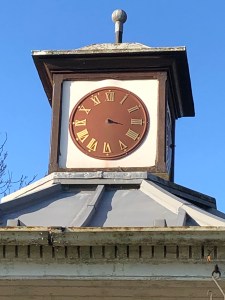 It snowed at the weekend. This may not sound terribly significant to you, but it doesn’t happen often where I live. When it does, the first thing you notice is the change in light – it is somehow both brighter and softer. There no longer seems to be a primary light source, instead there is a diffused glow. The sun is hidden by clouds and a falling flurry of white but its rays are reflected back from the ice crystals on the ground, the trees, the rooftops and fenceposts. Its as if one is surrounded by the light.
It snowed at the weekend. This may not sound terribly significant to you, but it doesn’t happen often where I live. When it does, the first thing you notice is the change in light – it is somehow both brighter and softer. There no longer seems to be a primary light source, instead there is a diffused glow. The sun is hidden by clouds and a falling flurry of white but its rays are reflected back from the ice crystals on the ground, the trees, the rooftops and fenceposts. Its as if one is surrounded by the light.
Often, when people talk about snow, they mention how quiet it makes everything seem. Well, all I can say is, those people must not live in an urban area. Usually, snowy days bring out squealing, laughing children, adults swearing as they slip on icy footpaths and the strained sounds of over-revving engines, grinding gears and the occasional thunk of metal on brick/wood/metal. But, we are in a lockdown, so my walk through the snow was unusually quiet. Apart from a few fellow dog walkers and some dedicated runners (dedicated or crazy? Who goes out in the snow in shorts and t-shirt?) we had the paths and parks to ourselves.
For the first time, I was able to really hear the sounds of snow. When large clumps were falling, they brushed past the hood of my waterproof jacket making rustling, shushing noises. When the snow was finer and more icy the sound on my hood was more like hissing rain. Walking on snow covered pavements, the snow beneath my wellington boots went pop crunch, pop crunch. On grass, my footsteps were more scrunchy.
After a while, I became aware that my body seemed comprised of several different temperate zones. My legs, above my socks and below my jacket, were cool but not uncomfortable. My feet were cosy in their woollen, waterproof cocoon. My body was warm but my shoulders and upper arms were chilled where the snow was clinging to my jacket. I was wearing a woolly hat under my hood and my scalp was hot and itchy. The sleeves of my coat hung halfway down my hands, so one half was toasty warm but, where the snow had soaked through my knitted gloves, my fingers were cold and wet. The scarf across my nose and mouth was moist from my breath, so my face was warm and wet. How can one body handle so many different temperatures at once?
I came back from my walk with a head full of ideas about incorporating sensory details into my writing and eager to put them into practice. By the time I’d stripped off my outer layers, defrosted my fingers, scratched my itching head and dried off my over-excited dogs I was more concerned with finding slippers and a hot drink than pen and paper.
It’s raining now. The crisp chill of my snowy walk feels like it happened weeks ago rather than days, but by thinking about the sounds and the sensory effects on my body, I can relive the experience. If I can get those sensations into my writing, maybe my readers can experience them, too.

 I got a new pen yesterday – look at it, isn’t it gorgeous? It perfectly matches the bottle of ink that was patiently waiting for it in the cupboard.
I got a new pen yesterday – look at it, isn’t it gorgeous? It perfectly matches the bottle of ink that was patiently waiting for it in the cupboard.





 Becky Bagnell announces her adjudication
Becky Bagnell announces her adjudication  L to R: Linda Welch, Nancy Saunders, Anthony Ridgeway, Scott Goldie and Kim Howard
L to R: Linda Welch, Nancy Saunders, Anthony Ridgeway, Scott Goldie and Kim Howard